7 Days Kilimanjaro Trekking Machame Route
7 Days, 6 Nights
Price from $2000
Tour Summary
Day 1
Machame Gate to Machame Camp
Accommodation: Machame camp
Meal Plan: Breakfast, Lunch, Dinner
Day 2
Machame Camp to Shira Camp
Accommodation: Shira camp
Meal Plan: Breakfast, Lunch, Dinner
Day 3
Shira Camp to Lava Tower to Barranco Camp
Accommodation: Barranco Camp
Meal Plan: Breakfast, Lunch, Dinner
Day 4
Barranco Camp to Karanga Camp
Accommodation: Karanga Camp
Meal : Breakfast, Lunch, Dinner
Day 5
Karanga Camp to Barafu Camp
Accommodation: Barafu Camp
Meal : Breakfast, Lunch, Dinner
Day 6
Barafu Camp to Summit to Mweka Hut
Accommodation: Barafu Camp
Meal : Breakfast, Lunch, Dinner
Day 7
Mweka Camp to Moshi
Book With Us
7 Days Kilimanjaro Trekking Machame Route Tour Overview
7 Days Kilimanjaro Trekking Machame Route (Whiskey) Route is Kilimanjaro’s most popular camping route. It’s a rugged combination of routes that begins through the rainforest at Machame Village on the southwest side of the mountain, and over seven days, rises onto the edge of the Shira Plateau, down into the beautiful Great Barranco Valley, then circumvents the Kibo massif counter-clockwise through the alpine desert until reaching Barafu Camp. From here, the trek to the summit is done overnight to the crater rim on the steep scree slopes of the east-south-east facing Mweka Route. The trek winds through some beautiful scenery, which changes quite dramatically every day. This route requires mental and physical toughness, due to the high altitude and short amount of time to rest before the overnight summit attempt. There are no huts on this route; the accommodation is in mountain tents and dining is in our dining tents
Day by day
DAY 1: Machame Gate to Machame Camp
•Elevation (ft): 5,400ft to 9,400ft
•Distance: 11 km
•Hiking Time: 5-7 hours
•Habitat: Rain Forest
The drive from Moshi to Mount Kilimanjaro National Park Gate takes about 50 minutes. The journey passes through the village of Machame which is located on the lower slopes of the mountain.
We now leave the park gate and walk through the rainforest on a winding trail up a ridge. Lower down, the trail can be muddy and slippery. Gaiters and trekking poles are a good idea here. We continue a short distance until we reach the Machame Camp.
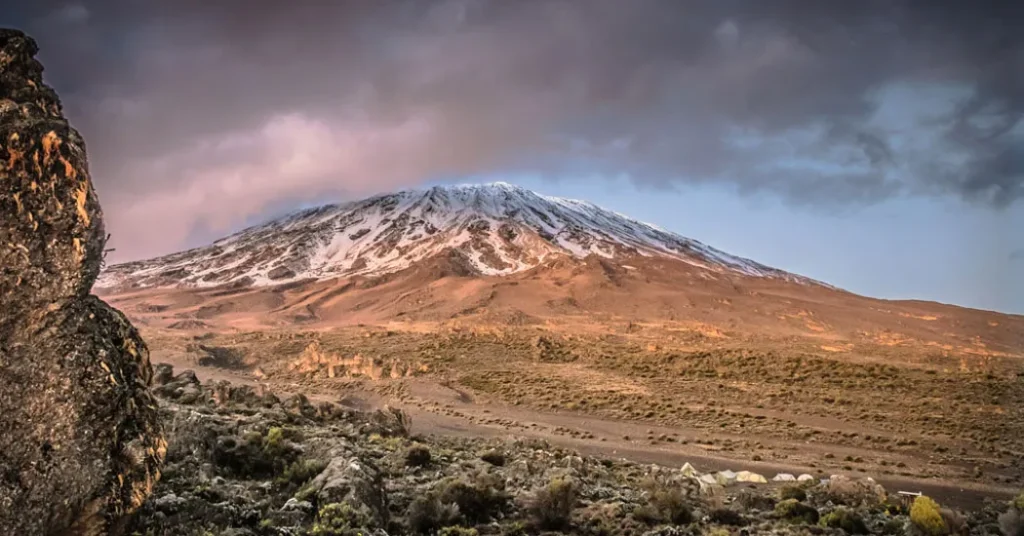
DAY 2 : Machame Camp to Shira Camp
•Elevation (ft): 9,400ft to 12,500ft
•Distance: 5 km
•Hiking Time: 4-6 hours
•Habitat: Moorland
After breakfast, we leave the glades of the rainforest and continue on an ascending path, crossing the little valley and walking along a steep rocky ridge, covered with heather, until the ridge ends. The route now turns west onto a river gorge. Time for rest, dinner, and overnight at the Shira campsite.
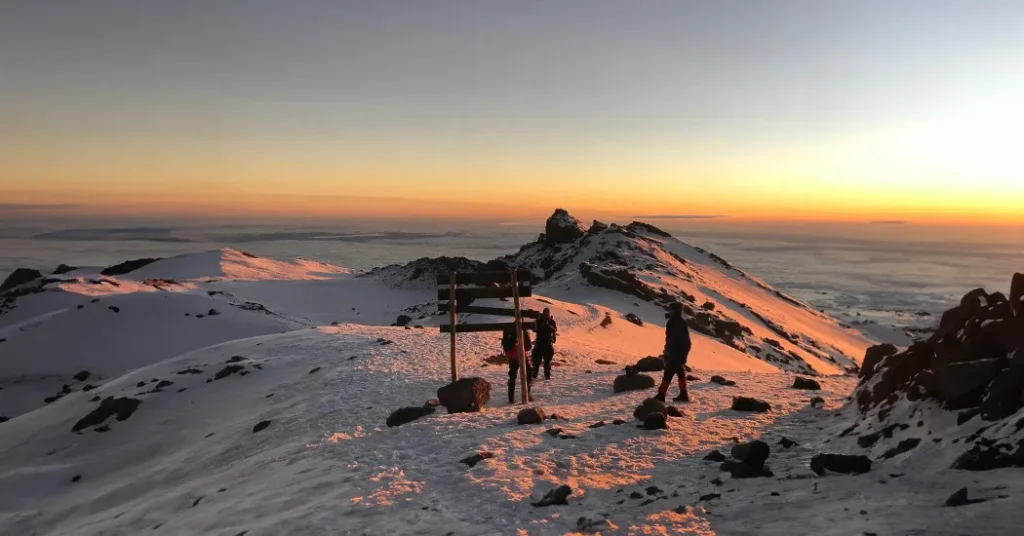
DAY 3 : Shira Camp to Lava Tower to Barranco Camp
•Elevation (ft): 12,500ft to 13,000ft
•Distance: 10 km
•Hiking Time: 6-8 hours
•Habitat: Semi Desert
From the Shira Plateau, we continue to the east up a ridge, passing the junction towards the peak of Kibo. As we continue, our direction changes to the southeast towards the Lava Tower, called the “Shark’s Tooth.” Shortly after the tower, we come to the second junction which brings us up to the Arrow Glacier at an altitude of 16,000ft. We now continue down to the Barranco Hut at an altitude of 13,000ft. Here we rest, enjoy dinner, and overnight. Although you end the day at the same elevation as when you started, this day is very important for acclimatization and will help your body prepare for summit day.
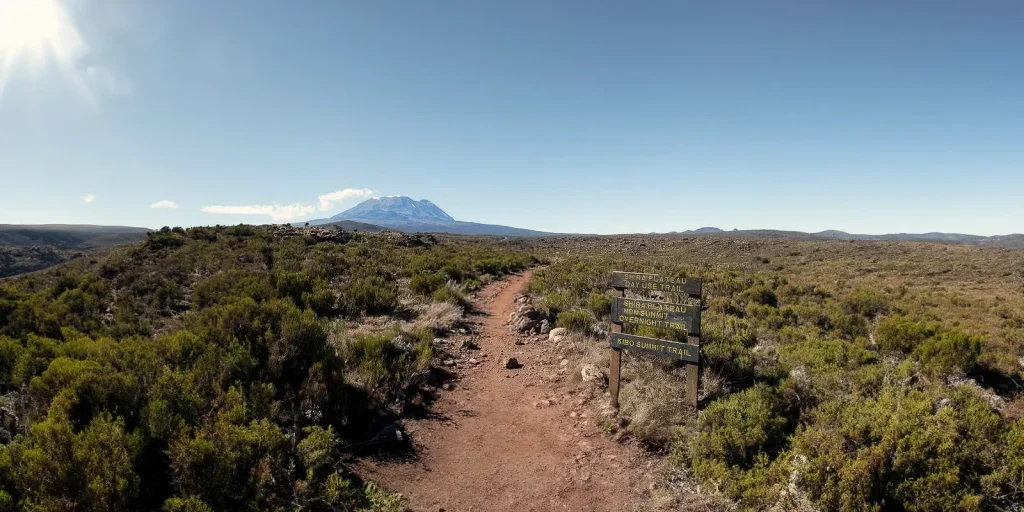
DAY 4 : Barranco Camp to Karanga Camp
•Elevation (ft): 13,000ft to 13,100ft
•Distance: 5 km
•Hiking Time: 4-5 hours
•Habitat: Alpine Desert
After breakfast, we leave Barranco and continue on a steep ridge passing the Barranco Wall, to the Karanga Valley campsite. This is a short day meant for acclimatization.
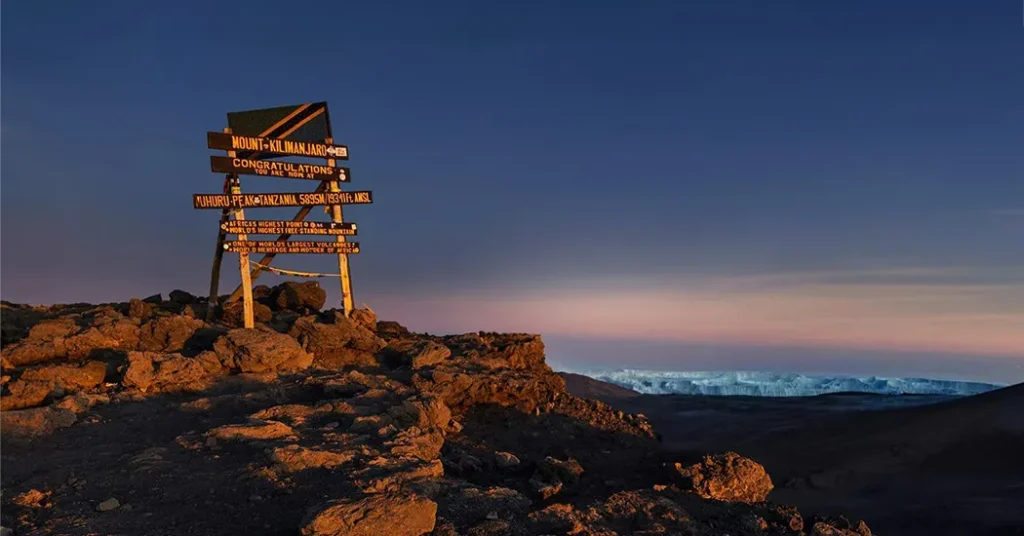
DAY 5: Karanga Camp to Barafu Camp
•Elevation (ft): 13,100ft to 15,300ft
•Distance: 4 km
•Hiking Time: 4-5 hours
•Habitat: Alpine Desert
After breakfast, we leave Karanga and hit the junction which connects with the Mweka Trail. We continue up to the Barafu Hut. At this point, you have completed the South Circuit, which offers views of the summit from many different angles. Here we make camp, rest, enjoy dinner, and prepare for the summit day. The two peaks of Mawenzi and Kibo are to be seen from this position.
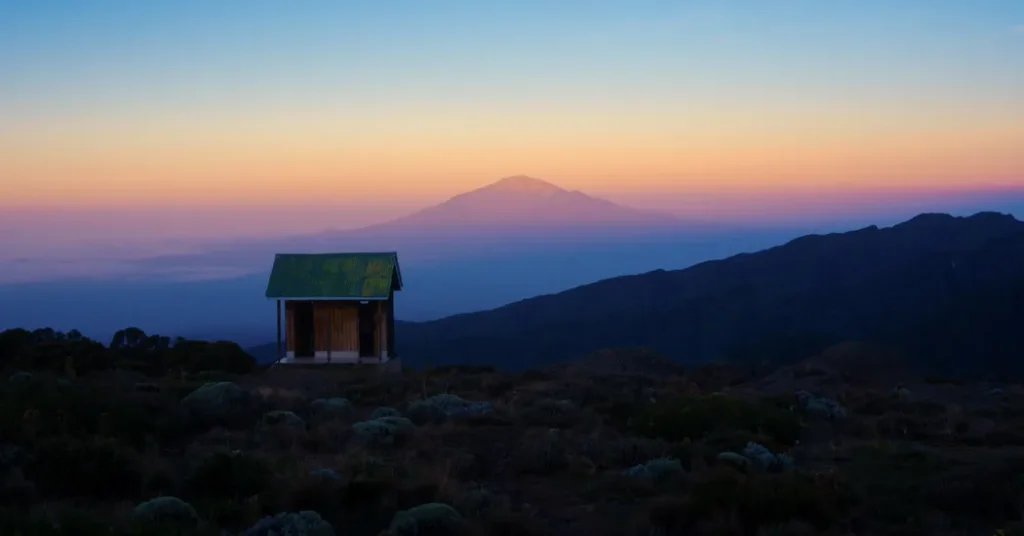
DAY 6: Barafu Camp to Summit to Mweka Hut
•Elevation (ft): 15,300ft to 19,345ft (and down to
10,000ft)
•Distance: 5 km ascent / 12 km descent
•Hiking Time: 7-8 hours ascent / 4-6 hours descent
•Habitat: Arctic
Very early in the morning (midnight to 2 am), we continue our way to the summit between the Rebmann and Ratzel glaciers. You head in a northwesterly direction and ascend through heavy scree towards Stella Point on the crater rim. This is the most mentally and physically challenging portion of the trek.
At Stella Point (18,600 ft), you will stop for a short rest and will be rewarded with the most magnificent sunrise you are ever likely to see (weather permitting). From Stella Point, you may encounter snow all they way on your 1-hour ascent to the summit. At Uhuru Peak, you have reached the highest point on Mount Kilimanjaro and the continent of Africa. Faster hikers will see the sunrise from the summit.
From the summit, we now make our descent continuing straight down to the Mweka Hut camp site, stopping at Barafu for lunch. You will want gaiters and trekking poles for the loose gravel going down. Mweka Camp is situated in the upper forest and mist or rain can be expected in the late afternoon. Later in the evening, we enjoy our last dinner on the mountain and a well-earned sleep.
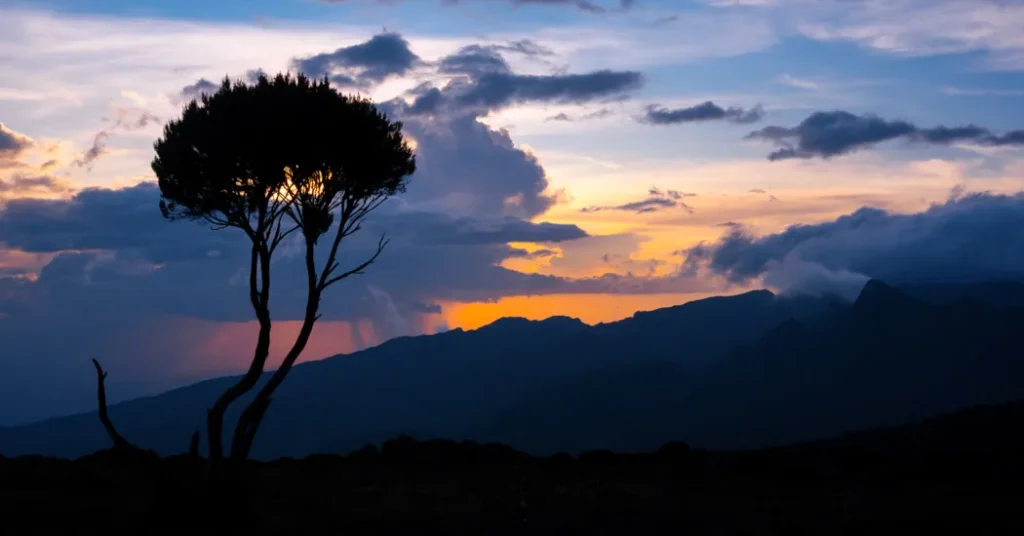
DAY 7: Mweka Camp to Moshi
•Elevation (ft): 10,000ft to 5,400ft
•Distance: 10 km
•Hiking Time: 3-4 hours
•Habitat: Rain Forest
After breakfast, we continue the descent down to the Mweka Park Gate to receive your summit certificates. At lower elevations, it can be wet and muddy. Gaiters and trekking poles will help. Shorts and T-shirts will probably be plenty to wear (keep rain gear and warmer clothing handy). From the gate, you continue another hour to Mweka Village. A vehicle will meet you at Mweka village to drive you back to the hotel in Moshi.
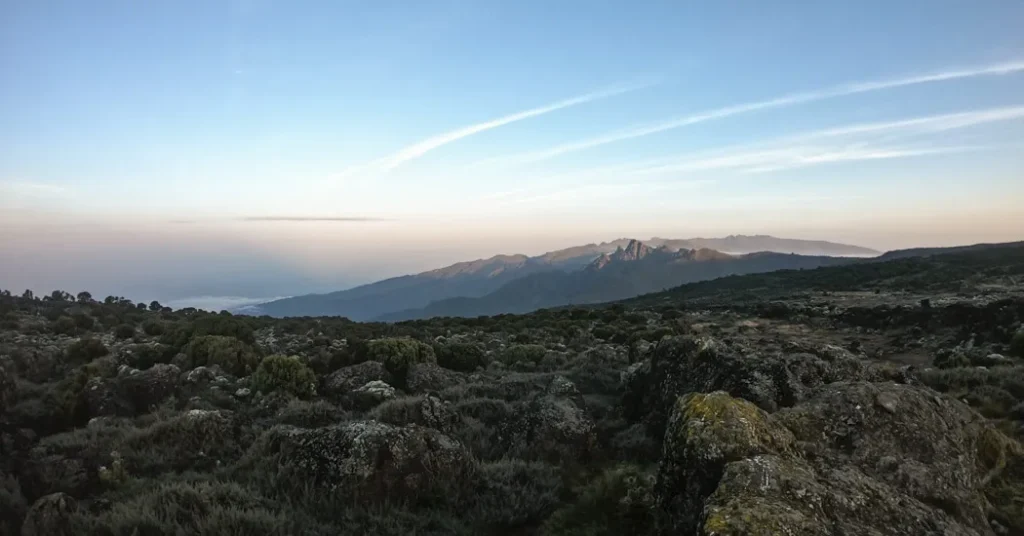
Price
| PAX | 1 PAX | 2 PAX | 3 PAX | 4 PAX | 5 PAX | 6 PAX |
| Price | $2206 | $2206 | $2206 | $2092 | $2092 | $2011 |
Inclusions
- Safety Equipment:
- Professional Mountain Guides, all head guides (at least 1 per trip) currently certified by NOLS USA as WFR (Wilderness First Responder)
- Park Fees
- Campsite fees
- Emergency Rescue Fees
- Camping equipment and other gears:
- Mountain Meals
- Transfer from the hotel to the starting point
- Transfer from the last point to the hotel
Exclusions
- Accommodation upon arrival and last day
- Tips for a mountain guide, recommended 15-20 per group per day
- Porters 5 – 10$ per porter per group per day
- Personal expenses
- Personal items
- Personal insurance/travel insurance
- Personal medicines/first aid kit
- Personal trekking gears
- Sleeping bag
